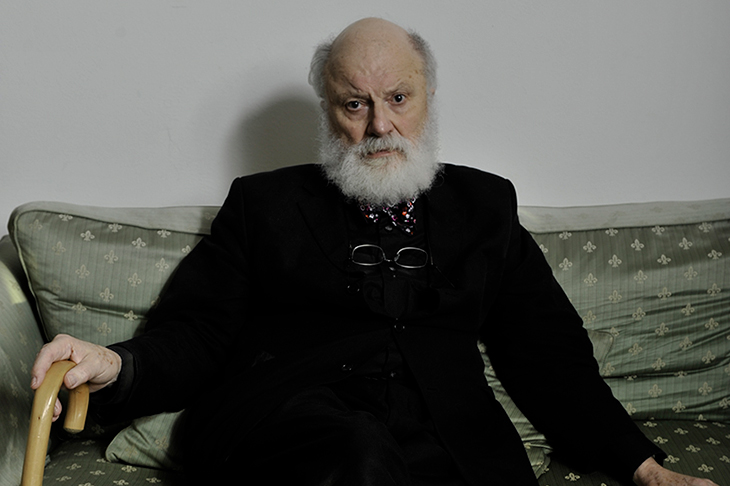In 2012 OUP published Geoffrey Hill’s Collected Poems; they could have waited, because they’re now going to need another edition. Between 2012 and his death, aged 84, in 2016, Hill wrote another 271 poems, and here they are — although, given his productivity since the mid-1990s, I wouldn’t be surprised if there were plenty more. But the poems in The Book of Baruch by the Gnostic Justin look as though they are part of a deliberate and ordered sequence, all of them using the same form, of irregular lines, occasional internal rhymes and Hill’s characteristic style, hopping over centuries with semi-cryptic allusions, barks of rage and mordant humour. I say ‘semi-cryptic’ because sometimes it is hard to follow his trains of thought. Take the 196th poem in the sequence:
The ‘high dome of Paul’s’ appears to crouch, these days, unless you approach
from the direction of the Fleet ditch; which is in any case the way of
tradition whose rites still confer benefits upon the nation.
The dry-mouthed state trumpeters contrive to spit a pure high note. The vault jitters
at the impetus, and, far below, something small immodestly clatters.
Cargo-cult majesty in Perrault travesty? Maybe, but not her fault.
It dawns on you that he is talking about the state funeral of Margaret Thatcher, but you have to join the dots between the allusion to Blake’s ‘Holy Thursday’ (‘the high dome of Paul’, in quotation marks), the significance of the Fleet ditch, the fact that St Paul’s is now dwarfed by new buildings (and does it ‘crouch’ in order to pounce, or out of subjection?), the weight or spin placed on words like ‘benefits’, ‘contrive’, and indeed ‘spit’, and the reference to the 17th-century writer Charles Perrault.
Hill’s chosen form, like Christopher Smart on steroids (for I will consider my poet Geoffrey, who also alludes to Smart within the work), allows him great freedom, and if there are some out there who will argue that this is not poetry, it’s certainly not prosaic. Every word here is charged, potent, lapidary. But then this was always the case with Hill.
The sequence is a meditation on poetry itself, on the history of the nation, and Hill has been paying attention. It is also a meditation on his own death: he writes of a man opposite his own hospital bed:
The absence of a curtain does not to my mind harm deportment, though I am
no connoisseur. I would not desire ‘privacy’ at this time as if dying were
an act of shame.
Hill’s deep thought about British politics — specifically, English politics — has always been evident, from the earliest days of his career, and his interest has not wavered, and it is ironically fitting, in a way, that his own demise may well have happened at a time when the very Union may be beginning to unravel. You want his thoughts on Brexit? You won’t like them. ‘In the impending referendum I shall vote to remain,’ he announces, despite the fact that in his collection Canaan he ‘derided the Maastricht Treaty as an international corporate fraud./ The alternative now is an England of rotten boroughs and Hobbits maudits’. But he lives to see the result, and the final poem of the book begins like this:
The numbness after the shock of exit, big-bummed Britannia in her tracksuit;
her phantom lap of honour; no other runner.
Hill has been accused of obscurity but I think that’s quite clear, yet also exposes — how best to put this? — a certain vanity and misplaced pride; it is considerably more nuanced than mere insult — as you see when you get to the end, evoking the brightness of roses ‘against the afterglow of each brief thunder-shower’. Roses? He didn’t pick on them by accident, nor on the metaphor of the thunder-shower. Whether they are white or red he doesn’t say, and doesn’t have to. When Hill mentions roses, you start thinking Lancaster and York; and in a way, then, this line ties up his career in a fitting bow. It is among his greatest work.






Comments